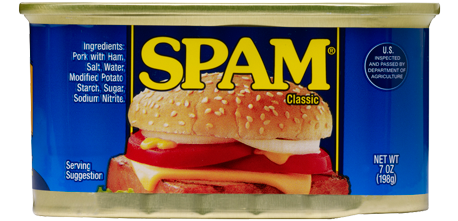What is Spam?

No, not this kind of Spam.
Besides being a beloved meat treat in Asia and Hawaii, it is an email communication that is unsolicited and unwanted. The CAN SPAM Compliance Act threatens up $16,000 per violation for a number of email no-no’s, however these are rarely enforced and it is Email Solution Provider that suffers from the sending of spam like communications.
From my experience, the worst a company has to deal with by sending out spam is the cancellation or suspension of their account. While this can be costly and disruptive to an organizations marketing, it pales in comparison to the damage mass amounts of spam can cause an ESP.
Email IP Addresses that are whitelisted and “seasoned” are hard to come by and take a long time to develop. It only takes one bad apple to ruin it for the bunch. So, if you want a strong partnership with your Email Solution Provider be aware of what you are bringing to the table or your relationship will be very short lived.
Here are my top indicators that you are probably spamming
You have had your accounts suspended by a reputable Email Solution Provider
Most email providers cut off your account at a 0.2% threshold for complaints. That means 2 out of every 1000 consumers marked your message as Spam. At FireDrum, we are way above the industry average and allow for three times this rate. Even with our generosity when it comes to complaints, if your company is over 0.6% complaint rate, you will be getting a call from us and most likely your account will be suspended.
We do this not because we are power mongers but because we are protecting your brand and preventing you from making a common marketing mistake – sending emails to people who do not want them.
Your campaign stats are horrible
If you send out an email campaign and 20% of your list bounces and only 1% open it, my guess is that your list is either purchased or you found it on a desktop that was tucked away in your utility room for the last decade. If consumers signed up to receive your emails, then I guarantee less than 20% of the emails will be invalid and more than 1% want to open something from your company.
You purchased a list

Don’t trust your reputation to this guy.
I have heard a thousand reasons why purchased lists are okay. They are not! The most common reason I hear is, “I bought a list form a trusted source (i.e. a publicly traded company), they cleaned my list and everyone on the list is opted in (Or my favorite, double opted in).”
Really? Everyone on this list opted in to receive the message you are about to send them? That is amazing since when they opted in they had no idea 2 years later you would buy their name and send them an email. Unless a consumer visits your store, site, social media page, and signs up directly to receive communications about your business then they did not opt-in nor do they want to receive anything from you.
Trust me, the only way to successfully grow your list is by engaging with consumers through different mediums and having them sign up to your email communication at their own free will.
The real issue with the purchased list dynamic is that it is illegal to send emails to consumers who have not explicitly signed up to receive your communications, however it is totally legal and profitable to sell these lists. An appropriate analogy would be to make all sales of drugs legal but use of them illegal.
If Congress wants to provide protection to consumers then they need to make the sale of lists to consumers illegal and then they would do some significant damage to the “Spam” Industry. (Though, thinking about my analogy, history might prove that not very effective)
Conclusion
No matter what anyone tells you, there is no way to cheat in email marketing. Do not buy or rent lists. You will be doing more damage to your brand than good. The companies that sell lists and offer list “hygiene”, email “blasts”, or rental of emails are playing in a very grey area of the Marketing world.
Stay away, I assure you your wallet and customer’s inbox will thank you.
Sign up for our once-a-month FireLine newsletter

